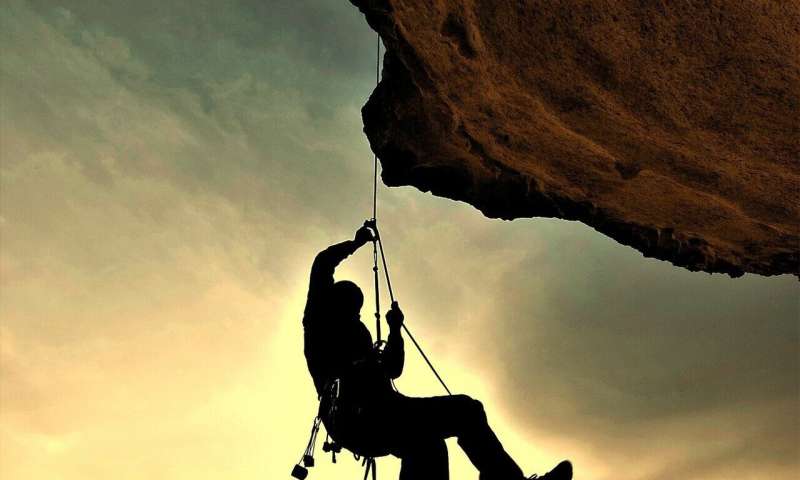Adventure skills help participants cope with pandemic restrictions

Psychological skills gained while rock climbing and kayaking helped participants navigate the COVID‑19 pandemic and restrictions, new University of Otago research shows.
The study, published in the journal Psychology of Sport and Exercise, investigates the lived experiences and psychological well-being of adventure recreation participants during COVID‑19 restrictions.
Lead author Patrick Boudreau, who completed the study as part of his Ph.D. at the University of Otago's Department of Tourism, says taking part in sports like base jumping, white-water kayaking and rock climbing may have psychologically protective qualities and enhance resilience.
A small number of people from around the world who regularly engaged in these adventure sports before the pandemic were interviewed during the first quarantine and lockdown.
Since Government regulations prevented them from taking part in their preferred sport during lockdown, they shared the negative impacts the pandemic had on them, such as increased uncertainty, fear and boredom.
However, they were able to use their adventure sports skills to maintain their psychological well-being.
"They discussed using various psychological strategies they developed during their participation in adventure recreation to reduce the ill-being effects of the pandemic," Mr. Boudreau says.
Adventure sports encourage participants to explore and deal with uncertainty, as well as giving them the opportunity to face psychological and physical challenges.
"Practicing to manage these risks and challenges and develop skills for an activity that requires you to be autonomous and responsible may in turn translate to regulating one's emotions in other spheres of our lives," he says.
"For example, managing the stress of a pandemic may be easier when you have already managed the stress of jumping off a cliff with a single parachute."
Some of the skills that helped participants during the pandemic include the ability to be flexible, manage emotions and focus on controllable elements.
One kayaker related it to having to "go with the flow" when on the water.
"In the river you have to have a plan A, B, C and D. You might get to plan D and realize that doesn't work either—that ability to be really flexible and understand that sometimes there are bigger forces at play [is useful]."
Despite restrictions, participants found there were some silver linings to the pandemic.
Not comparing their lives to others, reconnecting with loved ones and opportunities to enjoy nature at a slower pace were some of the "somewhat surprising" results, Mr. Boudreau says.
"This study highlights the importance of looking beyond adventure benefits strictly related to risk, challenge or competence, such as the important role of adventure communities, social connections, and connections to nature afforded by adventure."
More information: Patrick Boudreau et al, Adventure-based mindsets helped maintain psychological well-being during COVID-19, Psychology of Sport and Exercise (2022). DOI: 10.1016/j.psychsport.2022.102245



















